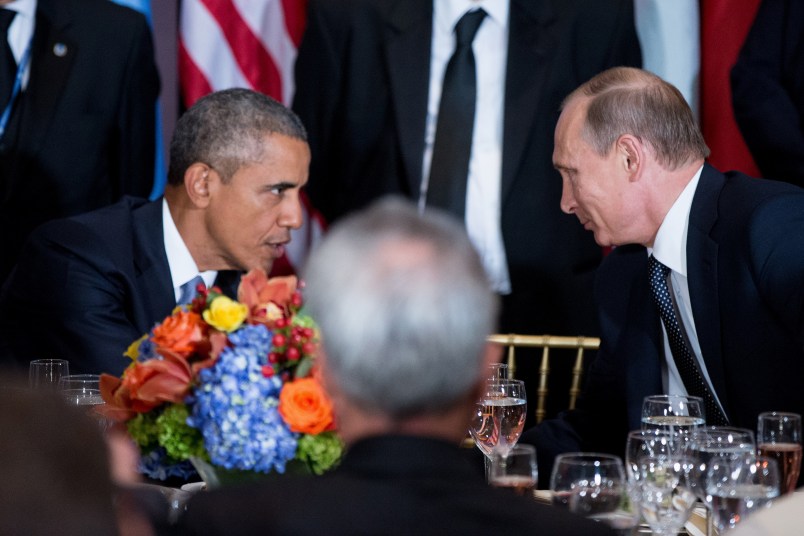With the furor over the Trump campaign and the on-going DNC et al. hacking story, I’ve become increasingly interested in what was already a pet interest of mine: the growing list of Russian propaganda networks operating in the West and Russia’s growing embrace of asymmetric warfare, particularly information warfare, whether in the form of hacking, surreal state-sponsored trolling operations or news and propaganda networks operating more or less openly with state sponsorship. But before getting into a series of posts on the subject, I wanted to start with one key and often overlooked point.
Quite simply, Russia is a weak and declining power and its various forms of mischief and aggressive behavior are far more signs of weakness than anything else. I mentioned before that notwithstanding the fact that a number of Russia hawks grabbed on to my recent writing on Trump and Russia, I’m not one of them. Going back many years I’ve thought that through a mix of overreach and myopia the US has been needlessly and counterproductively aggressive in extending its geopolitical reach up to the borders of the current Russian state. This doesn’t mean I think Russian intentions in say Georgia or Ukraine or the Baltics are benign. Far from it. But what are our intentions exactly and what are our interests?
What sort of relations do we want to have with Russia? And is supporting and/or promoting US-aligned states across Russia’s borders, with various forms of military relationships, one that is likely to make anything but antagonistic relations possible? It’s hard for me to see how that is not the case. Obviously this doesn’t mean we allow Russian to dominate every post-Soviet state or former member of the Warsaw Pact. We’re bound through NATO to defend all NATO member states. That is inviolable. But as a general matter I’ve supported and support what I think of as a more pragmatic and less confrontational approach to the region.
So with all that said, here’s the point I wanted to make for today.
With the DNC hacking operation (which seems likely to be Russian government backed but might not be), the on-going crisis in Ukraine, Russia’s role in the Middle East, various possible ways of trying to make mischief in the US election etc etc etc, we shouldn’t lose sight of an essential point: Russia is a weak and vulnerable state with geopolitical pretensions wildly out of sync with its national wealth and power.
Here are some statistics that may surprise you. Most people understand that the geographically pared down post-Soviet Russia doesn’t have nearly the military or economic might of the Cold War days. But the sheer degree may surprise you. Fundamentally, national and military power rests on economic might. But judged by gross domestic product, on most lists Russia clusters somewhere in the neighborhood of Mexico, Australia or South Korea in terms of the size of its economy. Think about that: the Russian economy is about the size of Australia’s. On most global economic lists Canada’s economy is substantially larger than Russia’s.
Countries can of course decide to spend a disproportionately large share of their national wealth on their military. Israel for instance spends 5.4% of GDP on its military, down from 7.5% in 2006. But economic might fundamentally constrains military power. It’s notable that the percentage Russia spends on its military, like Israel’s, is 5.4% of GDP, which is up from 3.5% ten years ago. But with its vast land mass, ambitions in Europe, the Middle East, Central Asia and the Far East, the Russian economy simply can’t sustain those ambitions in military terms. Russia has a massive nuclear stockpile. That will always put it high on the list of US security concerns. But the power of nuclear weapons alone tends to be a negative and defensive power.
And there’s an additional fact: the Russian economy has a huge dependency on oil and gas. Both are in historic price slumps. And while those slumps won’t last forever,there are many reasons to think prices will never recover to the level they were at say a decade ago. In any case, energy commodity prices are inherently a boom and bust affair. All of which is to say that Russian economic might, such as it is, isn’t diversified and resilient but rather brittle and precarious.
I put these facts on the table for two reasons.
First is to make what I believe is the straightforward point that anyone who says that Russia poses a huge threat to the United States or that Russia is ‘on the march’ or outflanking the US or whatever else is simply wrong. Russia is small and weak. This doesn’t mean that there couldn’t be a cataclysmic outcome if NATO and Russia came to blows in the Baltics. But that doesn’t change this fundamental point: Russia is small and weak. All its actions must be seen in the context of a vastly more powerful United States combined with a strong and rising China and various other rising states which once were viewed as part of the ‘third world’ but are now becoming regional and even global powers.
Second, Russia’s weakness is the context in which we have to understand its embrace of asymmetric information warfare or conflict and ways to assert power short of warfare.
More on all these points in a future post.






